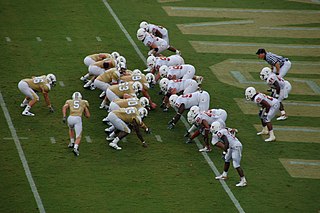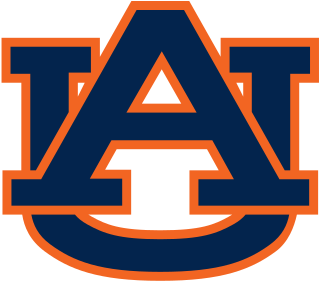Related Research Articles

The Bowl Championship Series (BCS) was a selection system that created four or five bowl game match-ups involving eight or ten of the top ranked teams in the NCAA Division I Football Bowl Subdivision (FBS) of American college football, including an opportunity for the top two teams to compete in the BCS National Championship Game. The system was in place for the 1998 through 2013 seasons and in 2014 was replaced by the College Football Playoff.
The rating percentage index, commonly known as the RPI, is a quantity used to rank sports teams based upon a team's wins and losses and its strength of schedule. It is one of the sports rating systems by which NCAA basketball, baseball, softball, hockey, soccer, lacrosse, and volleyball teams are ranked. This system was in use from 1981 through 2018 to aid in the selecting and seeding of teams appearing in the NCAA Division I men's basketball tournament as well as in the women's tournament from its inception in 1982 through 2020.
Jeff Sagarin is an American sports statistician known for his development of a method for ranking and rating sports teams in a variety of sports. His Sagarin Ratings have been a regular feature in the USA Today sports section from 1985 to 2023, have been used by the NCAA Tournament Selection Committee to help determine the participants in the NCAA Men's Division I Basketball Championship tournament since 1984, and were part of the college football Bowl Championship Series throughout its history from 1998 to 2014.

A sports rating system is a system that analyzes the results of sports competitions to provide ratings for each team or player. Common systems include polls of expert voters, crowdsourcing non-expert voters, betting markets, and computer systems. Ratings, or power ratings, are numerical representations of competitive strength, often directly comparable so that the game outcome between any two teams can be predicted. Rankings, or power rankings, can be directly provided, or can be derived by sorting each team's ratings and assigning an ordinal rank to each team, so that the highest rated team earns the #1 rank. Rating systems provide an alternative to traditional sports standings which are based on win–loss–tie ratios.

The BCS National Championship Game, or BCS National Championship, was a postseason college football bowl game, used to determine a national champion of the NCAA Division I Football Bowl Subdivision (FBS), first played in the 1998 college football season as one of four designated bowl games, and beginning in the 2006 season as a standalone event rotated among the host sites of the aforementioned bowls.

The Auburn Tigers football program represents Auburn University in the sport of American college football. Auburn competes in the Football Bowl Subdivision (FBS) of the National Collegiate Athletic Association (NCAA) and the Western Division of the Southeastern Conference (SEC).

The 2001 NCAA Division I-A football season was the first college football season of the 21st century. It ended with the University of Miami winning the national title for the fifth time.

The 2003 NCAA Division I-A football season ended with an abundance of controversy, resulting in the claim of a split national championship. This was the first claimed split title since the inception of the BCS, something the BCS intended to eliminate. Due to on-field circumstances, the BCS becoming a means of having a single champion going forward, and finally the four-team title playoff system's institution in 2014, as of 2024 this is the most recent Division 1-A season to end with split national champions.

Kenneth Massey is an American sports statistician known for his development of a methodology for ranking and rating sports teams in a variety of sports. His ratings have been a part of the Bowl Championship Series since the 1999 season. He is an assistant professor of mathematics at Carson–Newman University in Tennessee.
The 2005 Rose Bowl Game was the 91st edition of the college football bowl game, held on January 1, 2005 at the self-named stadium in Pasadena, California. The Texas Longhorns, second-place finishers in the Big 12 Conference's South Division, defeated the Michigan Wolverines, co-champions of the Big Ten Conference, 38-37. Texas quarterback Vince Young and Michigan linebacker LaMarr Woodley were named the Rose Bowl Players of the Game, the first time that the Rose Bowl separately recognized an offensive and defensive player of the game.

The Conference USA Football Championship Game is an annual American football game that has determined the season champion of Conference USA (CUSA) since 2005.
In American college football, the 2007 BCS computer rankings are a part of the Bowl Championship Series (BCS) formula that determines who plays in the BCS National Championship Game as well as several other bowl games. Each computer system was developed using different methods which attempts to rank the teams' performance. For 2007, the highest and lowest rankings for a team are dropped and the remaining four rankings are summed. A team ranked #1 by a computer system is given 25 points, #2 is given 24 points and so forth. The summed values are then divided by 100. The values are then ranked by percentage. This percentage ranking is then averaged with the Coaches Poll and Harris Poll average rankings, each receiving equal weight, and the results become the BCS Rankings.
The Bowl Championship Series (BCS) was a selection system used between 1998 and 2013 that was designed, through polls and computer statistics, to determine a No. 1 and No. 2 ranked team in the NCAA Division I Football Bowl Subdivision (FBS). After the final polls, the two top teams were chosen to play in the BCS National Championship Game which determined the BCS national champion team, but not the champion team for independent voting systems. This format was intended to be "bowl-centered" rather than a traditional playoff system, since numerous FBS Conferences had expressed their unwillingness to participate in a play-off system. However, due to the unique and often esoteric nature of the BCS format, there had been controversy as to which two teams should play for the national championship and which teams should play in the four other BCS bowl games. In this selection process, the BCS was often criticized for conference favoritism, its inequality of access for teams in non-Automatic Qualifying (non-AQ) Conferences, and perceived monopolistic, "profit-centered" motives. In terms of this last concern, Congress explored the possibility on more than one occasion of holding hearings to determine the legality of the BCS under the terms of the Sherman Anti-Trust Act, and the United States Justice Department also periodically announced interest in investigating the BCS for similar reasons.
In sports, strength of schedule (SOS) refers to the difficulty or ease of a team's/person's opponent as compared to other teams/persons. This is especially important if teams in a league do not play each other the same number of times.

The 2008 Utah Utes football team represented the University of Utah in the 2008 NCAA Division I FBS football season. The team, coached by 4th year head football coach Kyle Whittingham, plays its home games in Rice-Eccles Stadium. Utah was one of only two teams in the top-level Division I FBS to finish the regular season undefeated, but after the Broncos were defeated by TCU in the Poinsettia Bowl and Utah won the Sugar Bowl over Alabama, the Utes finished as the nation's only undefeated team. It was the fifth undefeated and untied season in school history. During the 2008-2009 season, Utah defeated 4 teams that were ranked in the AP's final poll: #6 Alabama, #7 TCU, #18 Oregon State, and #25 BYU. Utah also began the season by defeating the Michigan Wolverines—ranked #24 at the time—in Ann Arbor. This resume propelled Utah to finish the season ranked #1 in four out of the six BCS computer models: Sagarin (Elo-Chess), Peter Wolfe, Anderson & Hester, and Massey.

A national championship in the highest level of college football in the United States, currently the NCAA Division I Football Bowl Subdivision (FBS), is a designation awarded annually by various organizations to their selection of the best college football team. Division I FBS football is the only National Collegiate Athletic Association (NCAA) sport for which the NCAA does not sanction a yearly championship event. As such, it is sometimes referred to as a "mythical national championship".
David Rothman was an American statistician, public policy advisor, and the creator of a computerized college football ranking system.

The College Football Playoff (CFP) is an annual postseason knockout invitational tournament to determine a national champion for the National Collegiate Athletic Association (NCAA) Division I Football Bowl Subdivision (FBS), the highest level of college football competition in the United States. It culminates in the College Football Playoff National Championship game. The inaugural tournament was held at the end of the 2014 NCAA Division I FBS football season under a four-team format. The CFP expands to include twelve teams for the 2024 season.
The Billingsley Report is a college football rating system developed in the late 1960s to determine a national champion. Billingsley has actively rated college football teams on a current basis since 1970. Beginning in 1999, Billingsley's ratings were included as one of seven mathematical formulas included in the Bowl Championship Series (BCS) rankings.
The Colley Matrix is a computer-generated sports rating system designed by Dr. Wesley Colley. It is one of more than 40 polls, rankings, and formulas recognized by the NCAA in its list of national champion selectors in college football.
References
- ↑ "The Only Original and Unaltered* BCS Computer Rankings..." Andersonsports.com. 2006-12-03. Archived from the original on 10 December 2006. Retrieved 2006-12-12.
- ↑ Richard Billingsley (2002-07-21). "IN SEARCH OF A NATIONAL CHAMPION". cfrc.com. Archived from the original on 2006-07-20. Retrieved 2006-12-12.
- ↑ Wes Colley (2006-12-12). "Advantages in this Method". ColleyRankings.com. Archived from the original on 6 December 2006. Retrieved 2006-12-12.